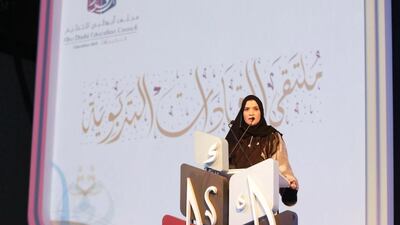ABU DHABI // More than 1,500 public school principals, vice-principals and university leaders met with Adec chiefs on Monday to hear the authority’s plans for transforming education in the emirate.
Dr Amal Al Qubaisi, the director general of Abu Dhabi Education Council, delivered a nearly one-hour speech to the school leaders, in which she praised their past accomplishments and called on them to stand up to the challenges of nurturing future leaders through the delivery of a 21st century education.
“During the past five years, we planted the seeds for transforming our education system,” Dr Al Qubaisi said. “During the next five years we shall transcend and reach new heights – we shall achieve the promise of a world-class education system.”
Dr Al Qubaisi listed a number of changes that have already taken place under her watch during the past year.
The curriculum for public secondary school pupils has been reformed to focus more on subjects related to science, technology, engineering and maths (Stem).
She noted the success of campaigns such as Abu Dhabi Reads and My Identity in promoting culture and national identity. The sports-focused Champions of Tomorrow programme was helping to develop future competitive athletes, she said.
She also mentioned Teach for UAE, which had resulted in an increased number of Emirati teachers and education leaders working in public schools.
“Thanks to you, we have been able to make the educational field an attractive one for Emiratis to become teachers,” Dr Al Qubaisi said.
Adec would continue its push for innovation and creative thinking in the classroom, she said, by establishing “innovation hubs” in schools where pupils could develop programming skills. An Innovation Ambassador programme would form partnerships with industry experts, who would visit schools to speak with pupils about new technology.
The Abu Dhabi Young Scientist Initiative “has built a culture of innovation” by encouraging students to get involved in national and international competitions.
“The journey of transformation involves a massive focus on Stem and building a sustained strong culture of education,” Dr Al Qubaisi said. “Without scientific research, we cannot achieve the full vision of a knowledge-producing society. Adec would even transform KG children’s story books to include stories about science and technology.”
To help strengthen the relationship between parents, students and teachers, some schools will be converted to community centres that would offer after-hours activities for families. “Achieving success would require a critical partnership – the most important partnership – partnership with the parents,” Dr Al Qubaisi said. “It is the most important partnership because education culture begins at home, it is promoted at home and it is nourished at home.”
Head teachers praised Adec’s initiatives, but also expressed some concerns and offered suggestions of their own. “It was an inspirational speech, we got now a clear vision about what will happen the next many years,” said Muna Thabit, an Emirati, the principal of Al Samha girls school in Abu Dhabi.
“We have to start to build a new generation that will create and will innovate, so we have to teach them from now how they can innovate. The challenge it will be how we will do all these things in a short period. This is the challenge actually now.”
Another major challenge mentioned by the teachers was finding a way to get parents to make sure their children attend school every day.
“What we face at our school and I hear from a lot of principals and vice-principals is getting the kids to school regularly,” said Janet Hilderbrand, academic vice principal, Al Wagan School in Al Ain. “We have students who would maybe come once a week and then disappear for a month. That is one of the biggest challenges. At Al Wagan, we have wonderful parents, good kids but still the hit and miss of attendance is probably our biggest thing because you can’t learn if you’re there once a week.”
newsdesk@thenational.ae

